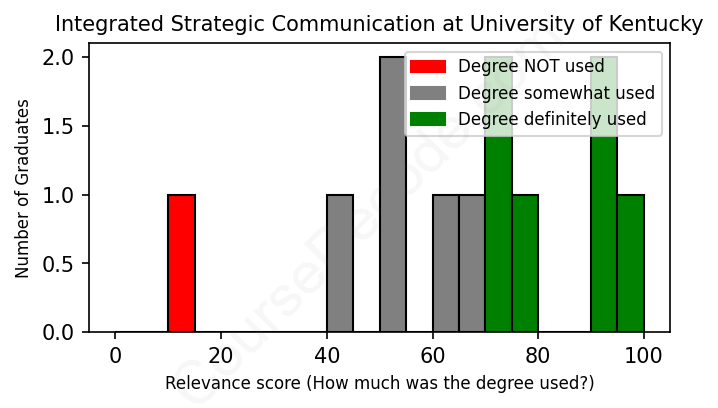
First, some facts. Of the Integrated Strategic Communication graduates from University of Kentucky we've analyzed , here's how many have used (or NOT used) their degree in their career:

These are estimates based on AI analysis of 12 LinkedIn profiles (see below).
The verdict? Slightly below average. Overall, with an average relevance score of 65%, Integrated Strategic Communication graduates from University of Kentucky have a slightly lower likelihood (-2%) of finding work in this field compared to the average graduate across all fields:
And for comparison, here's the chart for all profiles we've looked at across all degrees.
Also, after graduating, only 16% of these graduates have pursued further education other than another Bachelor's degree (such as a Masters degree or other), compared to the average across all profiles of 35%. This suggests a Bachelors degree is enough for most Integrated Strategic Communication graduates, and it's normal to look for work straight after graduation.
See the details:
|
Relevance score: 51% We think this person has gone into a career only somewhat relevant to their degree. We think this person has gone into a career only somewhat relevant to their degree.
DEGREE INFOGraduated in 2017 from University of Kentucky with a Bachelor of Arts (B.A.) in Integrated Strategic Communication. No other secondary education since. JOB HISTORY SINCE GRADUATIONSales Associate Anytime Waste Systems May 2017 - Nov 2017 Recruitment Coordinator  Trilogy Health Services, LLC Dec 2017 - Mar 2019 HR Technical Analyst  Trilogy Health Services, LLC Apr 2019 - Oct 2023 Learning Consultant  Trilogy Health Services, LLC Jun 2021 - Oct 2023 Digital Media Manager  Trilogy Health Services, LLC Oct 2023 - Present ABOUTNo information provided. |
The top 10 most common jobs done by the graduates we've analyzed (ranked most common to least) are:
After looking at the job history of graduates from the University of Kentucky with a degree in Integrated Strategic Communication, it seems like there’s a mixed bag of positions. Many of them have settled into roles in customer service, marketing, and digital media, which somewhat connect to their studies. For example, jobs like Digital Media Manager, Brand Specialist, and Account Manager exhibit a good use of communication skills that the degree promotes. Other graduates have taken paths that veer off into areas like administration and sales, where the connection to strategic communication is pretty loose. Positions like cashier or administrative assistant don’t really tap into the theory or practices of Integrated Strategic Communication at all, making you wonder how applicable their degree really was in the long run.
When you dig deeper, it’s clear that while some graduates are in roles that leverage their education effectively, many are either underutilizing their skills or simply not finding work that aligns closely with their degree. It’s a bit disappointing, honestly, because you expect that with a specialized degree, alumni would land right into a position where they can shine, but it seems like that’s not always the case. The digital and marketing-focused jobs seem to be the most relevant, which makes sense since the industry is evolving so fast with technology. So, in a nutshell, while some graduates are aligning their careers with their education, a good portion of them are finding themselves in jobs that don’t fully embrace what they learned in school.
Here is a visual representation of the most common words in job titles for Integrated Strategic Communication graduates (this is across all Integrated Strategic Communication graduates we've analyzed, not just those who went to University of Kentucky):

Graduates from the Integrated Strategic Communication program at the University of Kentucky generally show a diverse range of career trajectories, but many tend to land roles that are relevant to their field fairly quickly after graduation. For instance, you’ll find many of them starting out in customer-facing positions or administrative roles, like cashiers or office assistants, right after finishing school. Over time, a good number make their way into more specialized positions in marketing, digital media, and communications. By around five years after graduation, they're often taking on roles like digital solutions engineers or account managers, which indicate a clear path toward more strategic and leadership-oriented positions.
However, not every graduate seems to transition smoothly into their ideal careers. Some early positions, especially for those who graduated in the earlier years, appear to be quite unrelated to Integrated Strategic Communication and don't reflect the program's goals, like working as a cashier. Yet, as you look at the paths of graduates from 2017 onwards, you start to notice more aligned roles in marketing and communications that suggest a successful career build-up, leading to positions with more responsibility. By the ten-year mark, many are holding significant roles such as senior campaign managers or digital media specialists, which indicates that while the initial job search can be rocky, there tends to be a solid upward trend for those who stay in communications-related fields.
Honestly, getting a Bachelor’s degree in Integrated Strategic Communication can be pretty manageable, depending on your interests and strengths. At the University of Kentucky, like many places, the coursework tends to balance creative projects, presentations, and some theory, so if you enjoy communicating and working on campaigns, it might feel more fun than tough. You’ll have to stay organized and keep up with group work, and there might be some challenges with deadlines and the occasional heavy reading, but overall, it’s generally not considered an exceptionally difficult major. If you’re someone who likes to think outside the box and is good at connecting ideas and people, you’ll probably find it enjoyable and relatively easy to handle!
Most commonly, in the LinkedIn profiles we've looked at, it takes people 4 years to finish a Bachelor degree in Integrated Strategic Communication.
Looking at these Integrated Strategic Communication grads from the University of Kentucky, it seems like they’ve been working their way up pretty well. The earlier grad from 2011 seemed to start with pretty low-paying jobs, like cashiering and being an office assistant, but now as an admin assistant, they're probably making a decent salary. The 2017 grads really took off with positions like Account Manager and Senior Campaign Success Manager, which often pay good money in their fields. For the 2018 and 2019 grads, roles like Marketing Manager and Director of Engagement suggest they’re also on a nice financial trajectory. The 2020 grads have a mix, with some going the entrepreneurial route as a CEO, which could be lucrative. Overall, it looks like most of them have transitioned into roles that likely pay well, especially as they gain more experience. So yeah, it seems like they’re doing pretty good in terms of money!
Here is a visual representation of the most common words seen in the "about" section of LinkedIn profiles who have a Bachelor degree in Integrated Strategic Communication (this is across all Integrated Strategic Communication graduates we've analyzed, not just those who went to University of Kentucky). This may or may not be useful:

Here are all colleges offering a Bachelor degree in Integrated Strategic Communication (ordered by the average relevance score of their Integrated Strategic Communication graduates, best to worst) where we have analyzed at least 10 of their graduates:
| College | Score | Count |
|---|---|---|
 University of Kentucky University of Kentucky
|
65 | 12 |